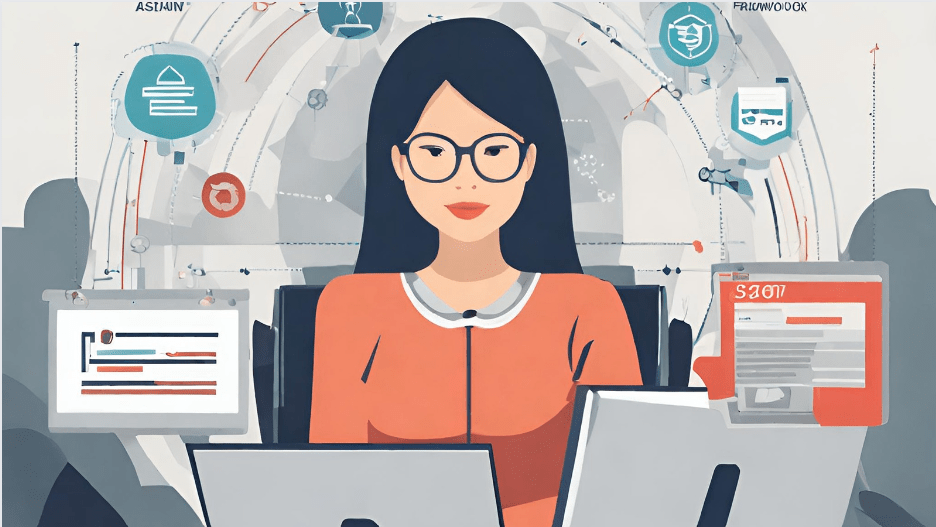As businesses rely more and more on adopting new technologies to stay competitive, accountants face a number of risks that can compromise the security and efficiency of their business. The use of increasingly sophisticated technologies by accountants and their clients offers significant benefits to both, but it also introduces vulnerabilities that can be exploited by criminals. This article looks at the digital risks accountants face, and answers some of the most frequently asked questions around the challenges posed by technology, as well as how to mitigate these threats effectively.
What are the risks facing an accountant?
Accountants handle sensitive financial data on behalf of their clients, making them prime targets for cyber attacks. The risks they face include:
- Data breaches: Unauthorized access to financial data can lead to significant financial losses, fines, and reputational damage. Accountants must implement strong security measures to protect against breaches and provide client confidence.
- Phishing attacks: Cybercriminals often use phishing emails to trick accountants and their staff into divulging sensitive information, granting access to secure systems, or even making payments directly!
- Malware and ransomware: Malicious software can disrupt accounting operations, steal data, or lock systems until a ransom is paid. These events can be difficult to recover from.
- Regulatory non-compliance: Failing to comply with data protection regulations like GDPR can result in hefty fines and legal consequences, a well as reputational damage.
- Human error: Mistakes in data entry or handling can lead to significant financial discrepancies and security vulnerabilities.
Many of these risks can be effectively managed by leveraging tools and services that provide digital governance for accountants.
What is the biggest challenge of an accountant?
The biggest challenge for accountants today is ensuring data security while leveraging technology to enhance their services. Balancing the need for efficiency with the necessity of robust cybersecurity measures requires constant vigilance, and regular review of both policies and processes. Accountants must stay updated on the latest cyber threats and regulatory changes, all while managing their day-to-day responsibilities.
What are the challenges of technology in accounting?
While technology brings numerous benefits to accounting, it also presents several challenges:
- Cybersecurity threats: With the increased use of digital and collaboration tools, accounting firms become more vulnerable to cyber-attacks. Implementing comprehensive cybersecurity strategies, as well a appropriate technology controls, is essential to protect client data.
- Regulatory compliance: Ensuring compliance with regulations such as GDPR requires significant effort and resources. Accountants must be aware of changes in the regulatory landscape, and adjust their policies and practices accordingly.
- Adopting new systems: Integrating new software with existing systems can be complicated. New systems may require new approaches, and compatibility issues can disrupt operations and lead to data loss.
- Staff security awareness: Staff must be adequately trained in cyber security to ensure their contribution to safeguarding customer data. Regular training and threat simulation help reinforce good practices.
- Data management: Handling large volumes of data securely and efficiently can be challenging. Accountants need robust systems for data storage, processing, and retrieval.
Protects™ offers solutions to support accountants with all these challenges, backed by an experienced team of qualified security professionals.
What are the risks associated with using technology?
Using technology in accounting introduces several risks, the most notable for accountants to manage include:
- Data breaches and cyber attacks: Protecting sensitive financial data from unauthorized access and cyber attacks is critically important, and effective security measures are essential.
- Software vulnerabilities: Exploitable weaknesses in software can compromise system security. Regular updates and security patches are necessary to mitigate these risks.
- Operational disruptions: Technology failures or system outages can halt accounting operations, leading to delays and financial losses.
- Compliance failures: Non-compliance with data protection regulations can result in severe penalties. Accountants must ensure their technology solutions support regulatory requirements.
- Supplier risks: Reliance on third-party vendors for software and services can introduce additional risks if those vendors lack adequate security measures.
How does GDPR affect accountants?
The General Data Protection Regulation (GDPR) has a significant impact on how accountants manage client data. Key aspects of the regulation include:
- Data consent: Accountants must obtain explicit consent from clients before collecting and processing their data.
- Data security: Implementing strong security measures to protect client data from unauthorized access and breaches is mandatory.
- Data access and portability: Clients have the right to access their data and request its transfer to another service provider.
- Breach notification: Accountants must report data breaches to the relevant authorities within 72 hours.
- Data minimization: Only essential data should be collected and processed, and it should be retained only for as long as necessary.
Non-compliance with GDPR can lead to substantial fines and reputational damage. Adhering to these regulations is critical for accountants, especially those operating within the EU or dealing with EU clients.
What is the GDPR training for accountants?
GDPR training for accountants typically includes:
- Understanding GDPR principles: Familiarity with data protection principles, individual rights, and breach notification requirements.
- Data handling best practices: Emphasizing data minimization, secure storage, and proper disposal methods.
- Client communication: Training on how to communicate GDPR-related information to clients, including obtaining consent and handling data access requests.
- Incident response: Procedures for identifying, reporting, and responding to data breaches.
- Continuous education: Ongoing training to stay updated with evolving data protection laws and practices.
Choosing the right industry accounting software supplier
Selecting the right software supplier is crucial for minimizing technology risks in accounting. Key considerations include:
- Security features: Ensure the software includes strong security measures such as encryption, multi-factor authentication, and regular updates.
- Regulatory compliance: The software should support compliance with relevant regulations, including GDPR and other data protection laws.
- Reputation and reliability: Choose a supplier with a strong track record and positive reviews from other accounting firms.
- Customer support: Good customer support is essential for resolving technical issues promptly and minimizing downtime.
- Scalability and integration: The software should be scalable to accommodate growth and compatible with existing systems.
By carefully evaluating these factors, accountants can select a software supplier that enhances their operations while minimizing digital risks.
Manage technology risks with Protects
Understanding and mitigating digital risks is more important than ever for successful accountancy firms. Cyber security threats, regulatory compliance challenges, and the complexities of technology integration require a proactive and informed approach. By staying vigilant, investing in robust security measures, and choosing reliable software suppliers, accountants can navigate the complex risk landscape and continue to provide secure and efficient services to their clients. YourDigitalCTO can support accountants with a range of tools and services available on demand. Protects™ provides accountants and their staff with the tools they need to create a robust security position, safeguarding client data and their professional reputation. Contact us today to find out more!


